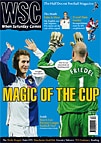 Just occasionally, a thumping win becomes a massacre. Ian Farrell looks back at the most recent time a League team posted double figures
Just occasionally, a thumping win becomes a massacre. Ian Farrell looks back at the most recent time a League team posted double figures
Though the points were totting up nicely, Manchester City’s record of ten goals in their first eight games of this season was nevertheless an underwhelming and depressingly familiar return. When, at the start of November, Sunderland were then subjected to their regulation 1‑0 defeat – the sixth such home win at Eastlands – nostalgic fans couldn’t help thinking back almost exactly 20 years, to a time when a very different MCFC matched Sven-Göran Eriksson’s eight-match stats in 77 insane minutes.
To hit double figures in any professional match is a major achievement; to do it in the league and therefore, theoretically at least, against opposition of a comparable standard is downright incredible, and hasn’t occurred again in English football since the events of November 7, 1987. However, City’s 10-1 annihilation of Huddersfield carries bittersweet memories. If Mel Machin’s team were capable of results like that, how did they end that Division Two season ninth, 12 points from the new‑fangled play-offs?
Despite relegation the previous spring and ongoing financial problems, there were still a few reasons for optimism as they started the new season. The stars of the 1986 FA Youth Cup-winning side, Paul Lake and David White, were starting to break through into the first team, while Paul Stewart, a £250,000 signing from Blackpool in March, looked a genuine find. That optimism quickly ebbed away with five defeats by early November but, even so, a Huddersfield side destined to end up with a record almost as horrific as their yellow-and-black chessboard away kit – 19 points from safety, just six wins all season, 100 goals conceded – weren’t expected to offer much resistance when they arrived at a far-from-full Maine Road.
Perhaps fittingly for such an illogical game, Malcolm Macdonald’s side dominated the early stages and it took the ever-reliable Neil McNab – moustachioed, ball-winning veteran and proof that the No 10 shirt never had the same cachet in Britain as it does in South America – to relieve 13 minutes of pressure with a 20-yard strike. Stewart made it 2‑0, still against the run of play, before Tony Adcock headed in his first City goal and David White grabbed a fourth from close range to end the game as a contest.
Commendably, Huddersfield came out strongly again after the restart, only to see Adcock double his total and take the scoreline into “rout” territory. Stewart edged it towards “massacre” with a looping header on 67 minutes, and within 60 seconds Adcock charged down a defensive clearance and ran in on goal to complete an incredible personal turnaround. At that point he must have been dreaming of headlines and man-of-the-match awards, but the last ten minutes would see his achievements seriously diluted, starting with Stewart tapping in a third of his own to cap a sensational individual performance and make it a staggering 8-0.
To have two hat-tricks in one game is extremely rare, to have three unheard of, and with five minutes to go it looked like it would stay that way. But when David White smashed in his second to set off the “we want ten” chants, it looked like a crazy day was about to get weirder. A last-minute Huddersfield penalty, converted by ex-Blue Andy May, threatened the momentum, only for White to be put through one-on-one and dodge past the onrushing keeper to make footballing history.
Adcock’s hat-trick was the brief highlight of a brief stay. Newly arrived from Colchester that summer, he’d be back in the lower leagues by January; Northampton‑bound in a swap deal for Trevor Morley. Stewart, the undisputed star of the season, moved in a different direction five months later, joining Terry Venables’ Spurs for £1.7 million, only a few hundred thousand pounds less than they would spend on Paul Gascoigne shortly afterwards and a fee he would struggle to justify. White did stick around, returning to Division One the following year and later finishing in the top five twice under Peter Reid. White also won one England cap, against Spain in 1992 under Graham Taylor, but his later career, at Leeds and Sheffield Utd, was hampered by injury.
The Huddersfield game was one of the few highlights of a disappointing campaign. Six weeks later City embarked on a run of seven defeats in nine matches that would kill hopes of an immediate return to the First Division and leave the 10-1 looking even more of a freakish blip. But there was worse to come. On April 2, to be exact, and a result just as significant in its own way, certainly for the opposition. For them, it was win number six: Huddersfield Town 1 Manchester City 0. The Maine Road match was supposed to be the turning point; it was almost like it never happened.
From WSC 252 February 2008